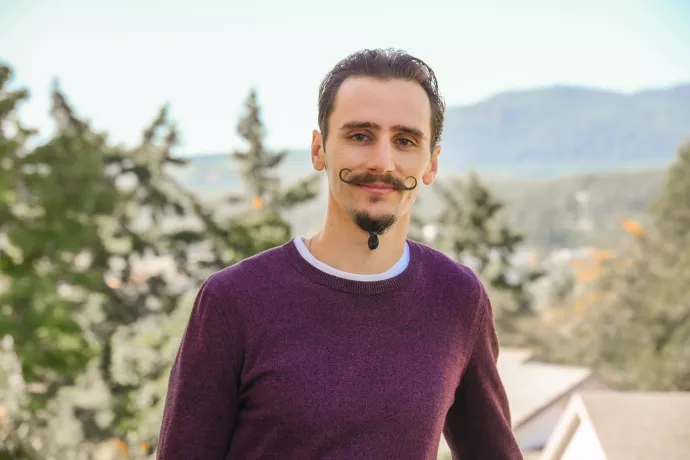Ariel Fabbro (MScSM 2017) Spotlights Sustainable Shoes and Slow Fashion

In 2023, Ariel Fabbro (MScSM 2017) turned his casual project into a full time role when he launched Cobbled Goods — an online platform showcasing the most sustainable small indie footwear brands from around the world.
Prior to studying at UTM he earned a BA in global studies from his hometown Vancouver Island University. For the past five years, Ariel has worked as a Knowledge Manager with the Embedding Project, developing resources including a public database that examines the credibility of corporate sustainability goals and a framework for advancing value chain sustainability. His role has taken him inside the corporate head offices of companies across Canada, the US, and South Africa in order to help them assess their sustainability performance, and he's also had the opportunity to give guest lectures on businesses sustainability at U of T and Simon Fraser University (SFU).
His work on Cobbled Goods reflects his interest in building a more democratic, equitable, and restorative economy, most recently by exploring alternative business models. We asked him about his time at IMI, and how it led to his exciting new venture.
You clearly have a passion for sustainability. What sparked that interest and ultimately led you to pursue a masters degree in sustainability management?
It’s an interest I’ve had as long as I can remember. Spending some time living on a sailboat growing up is probably a big part of that. The lifestyle naturally brings you close to nature and makes you mindful of resource use. It also gave me exposure to a global perspective at a young age that I think I still carry with me.
Heading into my undergrad my priority was following my interests over a specific career path. The interdisciplinary Global Studies program was a natural choice. It focused on understanding interconnected world issues and the role of the public sector’s in addressing them. After graduating I wasn’t originally planning to continue straight into a masters. But when I discovered the MScSM program it was the perfect next step to explore the same issues from the perspective of the private sector, where I felt there was more room for disruption.
How has studying at IMI, and the MScSM program impacted your career?
I really enjoyed my time at IMI. The MScSM program brings together enthusiastic, like-minded people from diverse backgrounds, which makes for a great learning and social environment. It was also very demanding. Getting used to a graduate level course load was one challenge; balancing it with my commitment to playing football for the Varsity Blues was another. That first semester, doing both was definitely a shock to the system.
In terms of my career, it has proved to be a perfect launchpad. The blending of business topics with environmental science prepared me well for landing a job with a leading edge corporate sustainability research and advisory group, the Embedding Project, based in Vancouver.
What exactly is slow fashion? Tell us a bit about your new endeavour, Cobbled Goods.
Slow fashion is the inverse of fast fashion. It is about alternatives to the dominant industrial system of mass-producing disposable products. Instead, the aim is to slow down to focus on craftsmanship, using materials thoughtfully, treating people respectfully, and sharing wealth fairly.
Cobbled Goods is a slow fashion platform for unique footwear from independent brands. The idea for it first sprouted shortly after graduating. I was looking for new shoes and took my search online to find something that aligned with my values. I discovered that there is a whole world of alternative footwear out there and wanted to share it. It began as a casual side project. But this year I’ve gone full time on it and just recently launched it! It’s live at www.cobbledgoods.com for anyone that wants to check it out.
The platform is designed to make thoughtful choices simple by finding and vetting brands for you. Unlike other sustainable fashion platforms, we put emphasis on first looking at how business design (e.g. governance, financing, purpose) affects sustainability outcomes before we look at the product design. It’s a more holistic approach that is inspired by the work of Marjorie Kelly and the Doughnut Economics Action Lab (DEAL).
Our vision is to create a cooperative network of smaller independent businesses that act as a real bottom-up alternative to the mainstream footwear industry. I like to think of it as something parallel to the rise of craft brewers.
What's your favourite place you’ve travelled to and why?
That’s a great question and I don’t know that I can pick one place. But most recently I had the chance to backpack through most of the western side of India from Punjab to Kerela. I was blown away by the cultural and geographic diversity and just how different it is from anywhere I’ve ever been before.
What is your advice for those starting out a career in sustainability and interested specifically in entrepreneurship?
More and more people are looking for impact-based work. It’s awesome but it also makes breaking into the field a challenge. If you’re just starting, I’d recommend looking for opportunities to volunteer for an organization that you are really inspired by. Another strategy would be to develop a more technical skill that you can use to get your foot in the door. On the entrepreneurship side I think the most important thing is to find a path and see it through. As much fun as it is to explore new ideas, sometimes you have to focus on pushing one thing forward or you’ll be spinning your tires.
Learn more about the Institute for Management and Innovation.



